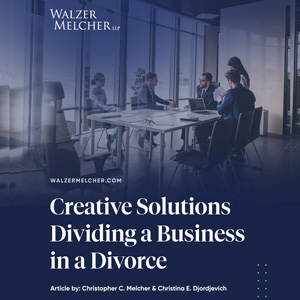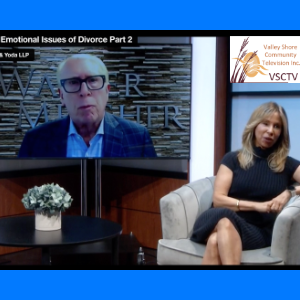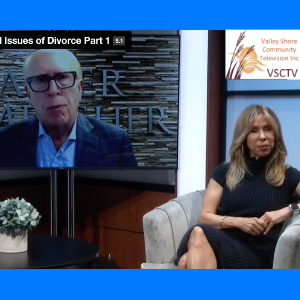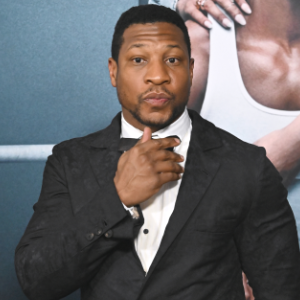
Direct Examination of Celebrity Lawyer Peter M. Walzer Part 3
[Source: BHBA]
Celebrity lawyer Peter M. Walzer, who is ranked as a best family law attorney in CA, discusses his greatest law successes, evidence code sections, niches and opportunities in family law, advice for lawyers, and more on BHBA Family Law Presents Direct Examination part 3.
Dan:
Welcome back to another episode of BHBA Family Law Presents Direct Examination with Dan Bemel and Lauren Youngman.
Today we welcome Peter M. Walzer from top family law firm Walzer Melcher Yoda LLP in Los Angeles, California for part 2 of his direct examination interview.
Lauren:
What do you consider some of your greatest successes in your career thus far?
Peter’s Greatest Successes in Law
Peter: Many these mediations where you settled the case, I mean the Valli case, which Chris talked about, taking it to the Supreme Court, resolving all the issues favorably, including that Supreme Court decision was terrific. Being president of the American Academy of Matrimonial Lawyers, 1600 of the top family lawyers in every state was an amazing honor, amazing deal. Chairing the state bar family law section and being part of premarital agreement legislation, fiduciary duty legislation, all that, amicus briefs, that was fabulous. Elkins task force, being appointed to that was like I was one of seven family law attorneys on that task force. Some of the best judges, judicial officers in the state. It was just an amazing deal and a lot of the legislation we see today for good or for worse is how we practice law is part of family law because of Elkins and just the collegiality between judges and saying, I want to put this on our judgment, so I want to call a RFO or request for order rather than an order to show cause, it happened. It’s like, “That was my idea. That was great.”
So that being part of all that was fabulous. I mean, many were being chair of the family law section of the LA County Bar, being president of the Association of Certified Specialists, but it wasn’t just the title, it was the people. I mean it’s all about the people, these great lawyers who are willing to give hundreds of hours of their time to make us all better. It’s just like, wow. I mean, so who cares about the title? It wasn’t about the title, it was about the people.
Dan:
What about the practice itself? We’ve talked on some of our prior episodes about the rise of mediation and ADR as a sea change over the last few decades. I guess, do you think that the mediation industry as a whole is a net positive for the practice or for the parties?
How Mediation Helps Everybody
Peter:
I think it’s great. It’s better for everybody. When I started, it was in court. There were some four-way meetings were a big thing and judges would tell you to go talk in the hall, but by then you’d spend a ton of money and forward, fast forward 40 years- most of the cases you do your disclosures and then you hire a private judicial officer in 1, 2, 3 sessions, you usually settle the case.
The downside of that is we don’t always get the easiest litigants now. Those are funneled off to mediators before they even see lawyers and they don’t even see us.
They go to a mediator first and they do all that in mediation. Now some of that could be for the worse where they don’t find out what the other side’s hiding, but in reality, how many people are hiding stuff? Everybody knows everything. In a marriage, you share an account, you see the person’s paycheck. There’s not hidden bank accounts in the Cayman Islands, so the easy clients, we do not see as much as we did in the beginning where we could just get in there and resolve the case. Usually there’s in our cases, there’s domestic violence, some kind of hiding money, some kind of issue, move away issues. Somebody is off balance, mental illness, drugs, unfaithful, all that. That’s why they come and see us. There’s something difficult in their lives that led them to the point, it’s just not your garden variety divorce.
Lauren:
They’re not calling you because they’ve got an easy, simple situation.
Peter:
And if they do, I say, have you seen a mediator?
Lauren:
Right.
Peter:
Have you gone to and I name, I have a list of people who could do the job, but that doesn’t mean that there are people that go to mediators that shouldn’t. I mean sometimes the mediator will just to get a deal, sell them down the road. I think it’s rare, but it does happen.
Lauren:
Another change that we spoke about a little bit in our prior conversation was the change in DV law that you’ve seen over the course of your career. What are your thoughts?
Changes in Domestic Violence Laws
Peter:
I mean, in my world, I generally don’t see people getting hurt. I see people using it as a tool to get an advantage in custody battles and especially with this new coercive control. Something that happened five, seven years ago, I didn’t want to have sex and she made me do it or he made me do it, all coming before the court, sucking up the court’s time with trials that need to be had and what is it? The court, the burden is more likely than not, it’s not clear and convincing evidence. It’s not beyond reasonable doubt, but the court can take away your child and with continuances and delays, you may not see your child for months depending on, and then it will be monitored, visitation, 52 weeks of counseling, all these different things.
It’s become a tool of the top divorce lawyers to sell somebody’s agenda.
Now I’m not talking about the real domestic violence, which again, I don’t see that. I’m not in those courts where we see that where somebody’s bloodied and battered and that’s where it’s totally justified.
In our world, it’s tactical and it’s unpleasant and I think the judge’s hands are tied where they have to treat every case as serious as it should be treated, but sometimes it’s just a tactic and they can go back for years and years and years and somebody could create a diary of everything that happened. And so I see it. I think that the burden should be higher. Maybe there should be a separate domestic violence court to take it out of the family courts. If the legislature feels this is important, fund it, so it takes it out of the family law court for normal folks so they can have their day in court and have decisions being made. It should be treated seriously, but at some point it’s driven a lot of judges out. The DV calendar will take all day and people that need their cases resolved can’t get there.
It’s also created a separate tier of justice so the people with money can go to private judicial officers and get their matters handled. I mean there’s a lot of good about it, but it’s concerning to us that you just can’t go to court and have your matter heard because there’s no time to hear it. I mean, our cases get continued and continued and continue and it’s like, what about the support? I’m sorry, I have three DVs on my calendar, but my client can’t eat. Well, I’m sorry, this is what the legislature says is important and we can’t hear your matter.
Peter:
That’s my rant.
Dan:
We’ll put a pin in that. But I want to talk about the bench a little bit. In terms of going to court, it seems like there’s been more turnover lately. Is that just, has it always been that way and has turnover on the bench changed the practice?
Turnover on the Bench
Peter:
It’s always been that way. Elkins came along and said, we want certified specialists. We want more permanency. I would say that part of Elkins was basically ignored. I mean there are a few token family law specialists on the bench, and it may be because there are not a lot of specialists, there may not be a lot that want to be bench officers and also the lure of going private. Even if they’re there, they become a specialist and they can go make $800 to $1,000 an hour being a private judge. Family law has always been a place for a public lawyer who became a judge to go on the bench and do their couple of years of penance and go onto something more exciting. I can’t think of what would be more exciting than family law.
Dan:
Yeah, haven’t talked about that at all today. So let’s actually use that as a jumping off point. You put together for our materials today, an amazing toolbox, your list of your favorite overlooked evidence code sections, not just arcane law. This is stuff that you use and you think everybody should know. I guess my first question is because of the turnover, how often do you find yourself briefing or explaining the code to the judicial officers?
Important Evidence Code Sections
Peter: All the time. I mean, you have to be a master of this because as judges will tell you, most lawyers don’t know the evidence code and it’s like going to a construction job without a hammer or nails saw. This is stuff we need to know and the good lawyers know all these, and we did skipped over relevance, authentication, secondary evidence rule and hearsay.
Those are a given and you really got to know that stuff, but these are things that you wouldn’t know. One of the rule is completeness. I can’t remember the code section. It’s in there, maybe it’s 6.12 or something like that is you go in with one text or one email or one letter and you don’t have the entire string or the other side does, and your honor, I’d like to see all the texts in this string because I need to see the context. The other side didn’t produce it, the judge should strike that evidence.
This whole thing about immigration and you can’t mention somebody’s immigration said, brand new statute- came up in one of my hearings recently. There was an issue about the motives of the other side in terms of getting married in a premarital agreement. Judge couldn’t hear any of that evidence of the person’s immigration status. We were talking about this rule on ceremonial marriages and everybody that does a lot of prenups has found out their clients never really got married. And there’s a evidence code section. Chris pointed this out to me that ceremonial marriages are presumed to be valid marriages. A presumption could be overcome, but there is a presumption. So these little things that are there to help lawyers, I mean they’re common sense stuff, but if you can cite a code section, you’re way ahead of the game.
Lauren:
Have you ever learned any of these code sections or rules that you keep in your toolbox now from someone surprising you or using it against you effectively?
Peter:
Probably all of them. I remember one lawyer, the judge didn’t like our client and was attributing all sorts of things, but we had some texts and we wanted to introduce them into evidence. And the other side’s rule of completeness, your honor, evidence code, I can’t remember the section, but you probably have it in front of you and judge says, “yeah, we’re keeping that out unless you have the entire string of text over four years, I’m not letting it in.” I mean the judge had it out for us, but still, I never forgot that. That’s how lawyers learn. That hits you once in the head and you will never forget it. So it’s good to know this kind of thing.
Dan:
Do you think for an attorney who follows your advice, you kind of, you’ve told us what you think a young attorney should be doing if they’re just starting out getting involved in the bar, learning, doing all these outside activities, do you think the family law business still provides a good opportunity for a young attorney?
Opportunities in Family Law
Peter:
I think it’s great. I mean, there’s so much opportunity and there’s so many niche practices. So many of the experts are retiring, whether it’s a specialty in child abduction, uniform child custody, jurisdiction enforcement act, which is child support enforcement collection. The old timers who did this stuff are retiring. A lawyer who knows something about pensions. I once gave a program, Pensions Made Easy and you learn so much, but there’s nobody around anymore who knows retirement plans, pensions, the ins and outs of tax issues.
Niches in Family Law
There’s so many niche practices. Domestic violence, I mean that is a full-time. You could just specialize in that and make a living and you generally could do it as a one woman shop. You don’t need to have a whole law firm. You could do crossover issues, whether, I mean you could do premarital agreements, cohabitation agreements. I’ve specialized in all these things at different points in my practice, but you can’t do it all. Recently we were looking for somebody who’s an expert on interstate and international custody laws, and I know a lot about it, but that’s not all I do. And you could have a nationwide practice in doing that and travel from state to state. There’s so much knowing the laws of foreign countries, Southeast Asia, Latin America, I mean just other languages. I mean, there’s so much here in LA you can create a niche or several niches like I did.
Lauren:
Is that a trend that you’re seeing? Is that something that wasn’t as common when you first started practicing and you’re seeing a lot more of now people specializing in very particular subfields of the family law world?
Peter:
I actually saw it more early on and I don’t see as much now and I don’t.
Lauren: Why do you think that is?
Peter: Because people don’t want to do the hard work to learn a specialty and promote it.
Dan:
If you could go back, right now, right, I mean you kind of talked about it with Elkins a little bit. If you could wave a wand and improve either the bar or the way the cases move through the system, what would be the biggest changes that you would want to see? I mean within reason, but budget considerations. You can’t have 100 new courts, but within reason, what would you want to see happen?
Peter:
I mean, I’d like to see less politics in terms of the legislation and more rational legislation taking into account … I mean, this is like if I had a fairy wand. This is not reality. This is Peter’s-
Dan:
No, Peter’s in charge.
Peter:
… fantasy that people would act rationally. Human beings would not act like humans, but the legislature’s an emotional body. They’re less and less lawyers in it, and I think that’s hurt it. The bar would be made up of lawyers policing lawyers. I just think that a lot of problems with when politics, the whole politics of domestic violence I think has hurt the practice and trying to create fault back into family laws.
Basically what it’s done, it’s gone through full cycle and looking at this, my dad was part of creating no fault in California, and the legislature has brought it back. And basically people want, for various reasons, gender politics bring fault back into family law and that’s what it’s done. So the judges will hear hours and hours of testimony about how he or she talked mean to them five years ago. So I think that if I had my magic wand, I’d have a more rational way of enacting legislation and vetting legislation.
But people react from their gut and I think that’s my learning. Judges react on emotion, less on the law and application of the law than reacting. I don’t like this person or this person did this bad thing. We’re going to do something. I don’t like the lawyer, so we’re going to react accordingly. But that’s fairyland and not really realistic. I think considering what we have, we do pretty well in terms of processing family law cases and the enormous amount. And the judges work really hard to get the cases through. I think their hands are tied with a lot of the rules and legislation, but we do pretty good for humans.
Lauren:
Well, in the last couple minutes we have, before we run out of time, we want to ask you some recurring questions that we’ve been posing to almost all of our guests. One of them is, what would you want your legacy in the family law community to be going forward? Or even more broadly?
Giving Back In Family Law
Peter: I would want it to be service. Service to others. I think the more service you give in your life to the bar, to the clients, it comes back to you in amazing ways. It creates a whole world of friends. I know a family lawyer pretty much in every state, every country, every province of Canada, from Mexico to Cape Town, South Africa, to Sydney, Australia. I mean, I got so much back. And if you give to the bar, you get back and that service pays you back. And to any lawyer is by doing that, the money comes. But by focusing on the money and what you’re going to get out of it, you’re just like any, you might as well be a ditch digger. You might as well be anybody else. It doesn’t make it meaningful, but by giving to the practice, you get back and also creating a professional, we didn’t talk about ethics, but doing the right thing makes you feel better, makes everybody feel good, better.
There is a culture if all you do need to be is a family lawyers to say no and be nasty. There are plenty of those out there. Anybody can do that, but not everybody can do this practice the ethical right way, honestly. And when you cheat, lie and steal, like many of us do, the only person that gets hurt is you -and you may have a big bank account, but you’ll die with a big bank account. And so what good is that? It’s more important to do it right ethically, to have other lawyers respect you. That’s worth a lot to have your kids respect you, to have your exes respect you, to have your spouses respect you, they know can trust you. Your word is your bond. That’s everything. Without that, you’re just another loser lawyer. Another rant, another rant.
Dan:
No, not at all. One of the things that’s been so great about this hour is that you’ve given, without us even asking, you’ve offered so much advice to experienced attorneys, new attorneys that we know watch and watch consistently. I am curious though, if you could go back and you can pick the time, whether that’s 13 year old rebel Peter or working for his dad Peter, at any of those points, if you could give your younger self some advice on your own journey and your own path, is there anything you’d want to say well to you or change your direction at any of those moments?
Advice for Lawyers
Peter: I think I’d like to have spent more time in court, not because of the fight, but I’d like to have sat in court and taken the time to just sit for days and days and just watch the judges and lawyers. And I’ve done that as a pro tem judge, but I like to do more of that and also watch the really fine lawyers in our practice what they do, and just take that time.
I think unless you’re working for somebody, which I never did, you really don’t have that mentoring to see how the good lawyers actually do it in court. And it’s hard to get trial experience. But you can go down there, you can volunteer for Levitt Quinn, you can volunteer for Harriett Buhai, get that experience and give back. And again, you’re going to get learn the evidence code. And that’s why I did my piece on the evidence code. Know the evidence code, know how to try a case, even if you’re going to be a mediator, even though if you don’t ever want to see a courtroom again, when you learn those tools, you learn about people, you learn about judges, you learn about how to be a good lawyer. And I wish I had done more of that.
Lauren:
All right. Well, this perfect timing and thank you so much for everything, Peter. This was a lot of fun and it was really fantastic. Everyone, please mark your calendars now to join us for our next episodes. They’re all at 12:30 PM on the first Wednesday of each month. As Dan mentioned earlier, we’ve got Samantha Klein, Glen Schwartz, Judge Scott Gordon, Stacy Phillips, Grace Jamara, and Michael Honasab, Aaron Gray, and Chelsea Stevens and Judge Harvey A Silverman all coming up. Thank you to Gena, Kathleen, and Belinda at the bar, the Family Law Executive Committee, which is currently led by Erin Gray and Chelsea Stevens, and of course our section sponsors. Most importantly, thank you Peter, again for being here and sharing so much.
Peter:
Thank you for having me, Dan and Lauren. Really appreciate it.
Lauren:
All right, everyone. We’ll see you next month.
©2023 BHBA. No claims made to copyrighted material. Aired 1/20/23.
5 More posts from Peter M. Walzer on Celebrity Divorce
More on High Net Worth Divorce

Nicole Kidman & Keith Urban’s Celebrity Divorce Explained





